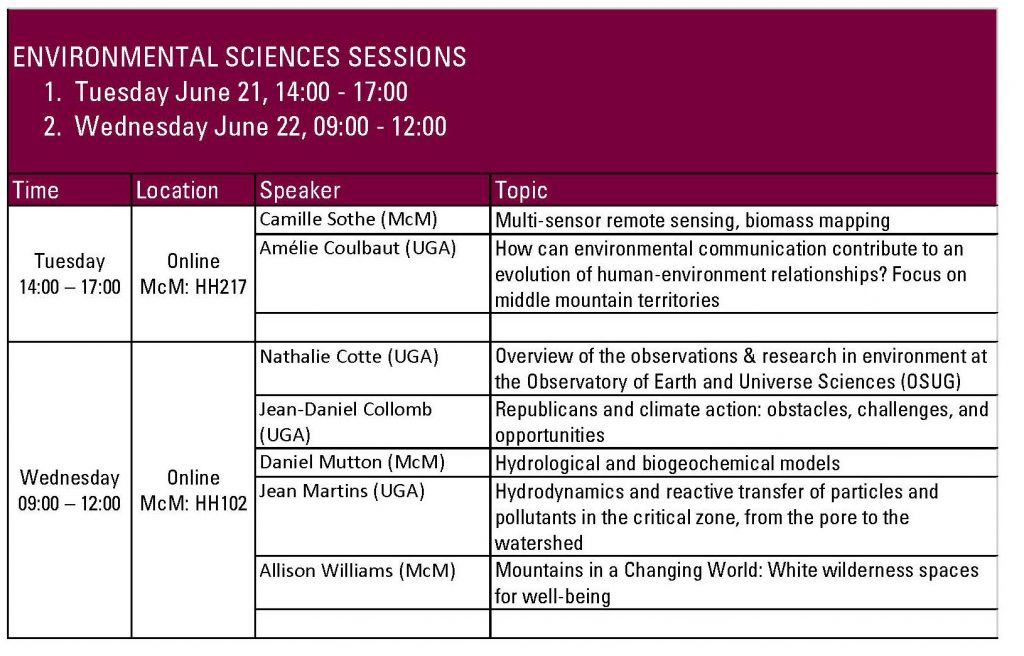Expandable List
Tuesday 2:00pm – 5:00pm Meeting Recording:
https://mcmaster.zoom.us/rec/share/W5sIP3mTkbFqkxJ95hlIPbMRLH04JM27i5QQVUXYNZc89XfRbV9zTD4GhaCDgG-6.69u5flYlcQeV1KlU
Access Passcode: M9DCWsU=
presentation begins at 9:10 mark
Wednesday 9:00am – 12:00pm Meeting Recording:
https://mcmaster.zoom.us/rec/share/GAxYPM7GV0m5IR6SNEHOkjAZtrL9D8dLWb4llLz0P_8eTthYL_FHSyHqQyOyzWMr.03eeDLFwuF5hZonK
Access Passcode: ?tXCd4VQ
presentation begins at 50:53 mark
Expandable List
Title: Multi-sensor remote sensing, biomass mapping
Expandable List
Title: How can environmental communication contribute to an evolution of human-environment relationships? Focus on middle mountain territories
Expandable List
Title: Overview of the observations & researches in environment at the Observatory of Earth and Universe Sciences (OSUG)
The Observatory is a structure which belong to a national network (managed by the CNRS) and has for missions to locally coordinate and support the research, the observation and the teaching in all these scientific domains : astrophysics, planetology, geophysics, geochemistry, geology, glaciology, hydrology, climatology, environment, ecology, sociology for the environment (risks, ressources, adaptability to changes,…). Including some transverse axes as for the instrumentation in extrem area. I will present an overview of our work in observing the natural systems, as well as the way the scientific projects can be constructed over different units thanks to specific programs, offering a holistic approach.
Expandable List
Title: Republicans and climate action: obstacles, challenges, and opportunities
Expandable List
Title: Hydrological and biogeochemical models
Expandable List
Title: Hydrodynamics and reactive transfer of particles and pollutants in the critical zone, from the pore to the watershed.
The HyDRIMZ team of IGE aims to study the quality of environments subjected to anthropogenic activities and climate change in contexts where bio-geochemistry is strongly constrained by water transfer conditions. The team approaches the study of strongly coupled phenomena characteristic of the critical zone through a close collaboration between soil physicists and hydrogeologists, surface water physicists, microbiologists and biogeochemists. The fine analysis of physical and bio-geochemical processes is based on combined modelling and experimental approaches under controlled conditions (infiltration in the field, laboratory devices) aiming to characterise and prioritise eco-mechanisms (transport, reactions, sorption) at the micro (pores, particles) and meso (columns, lysimeters) scales. The study of the spatio-temporal distribution of matter flows and impact, which is at the heart of the team project, is approached using numerical tools adapted to each situation, allowing the identified processes to be taken into account (e.g. hydro-sedimentary flows, reactive transfers in the vadose zone, hydrogeological transfers, Biogeochemical processes in the river-estuary salinity gradient). Examples of some important investigation lines will be presented and more specifically on soil erosion, bacteria transfer in soil and pollutants biogeochemistry and impact in the compartments of the critical zone.
Expandable List
Title: Mountains in a Changing World: White wilderness spaces for well-being


